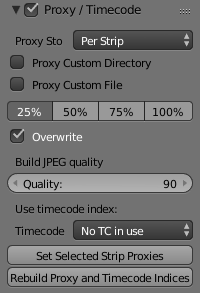Proxy/Timecode Panel¶
Once you have chosen the Proxy/Timecode parameters, you need to use to generate the proxy clip and it will be available after Blender makes it.
Proxy¶

A proxy is a lower resolution version (faster to load) that stands in for the main image or video. When you Rebuild proxy Blender computes small images (like thumbnails) for the big images and may take some time. After computing them, though, editing functions like scrubbing and scrolling and compositing functions like cross using these proxies is much faster but gives a low-res result. Disable proxies before final rendering.
In order to actually use the proxies, the proper Proxy Render Size selector value must be selected in the Properties region of the Sequencer View (where the edit plays back).
- Proxy Storage
Defines whether the proxies are for individual strips or the entire sequence.
- Per Strip
Proxies are stored in the directory of the input.
- Proxy Custom Directory
- By default, all generated proxy images are storing to the <path of original footage> /BL_proxy/<clip name> folder, but this location can be set by hand using this option.
- Proxy Custom File
- Allows you to use pre-existing proxies.
- Project
All proxies are stored in one directory.
- Proxy Directory
- The location to store the proxies for the project.
- Proxy Size
- Buttons to control how big the proxies are. The available options are 25%, 50%, 75%, 100 percent of original strip size.
- Overwrite
- Saves over any existing proxies in the proxy storage directory.
- Quality
- Defines the quality of the JPEG images used for proxies.
- Timecode
- See Timecode.
- Set Selected Strip Proxies
- Same as choosing the Proxy Size and Overwrite.
- Rebuild Proxy and Timecode Indices
- Generates Proxies and Timecodes, same as doing .
Timecode¶
When you are working with footage directly copied from a camera without pre-processing it, there might be bunch of artifacts, mostly due to seeking a given frame in sequence. This happens because such footage usually does not have correct frame rate values in their headers. So, for Blender to calculate the position of a needed frame in the stream works inaccurately and can give errant result. There are two possible ways to avoid this:
- Preprocess your video with, say, mencoder to repair file header and insert correct keyframes.
- Use Proxy/Timecode option in Blender.
Options¶
- Timecode
- Timecode to use on the selected movie strip.
The following timecodes are supported:
- No TC in use- do not use any timecode
- Record Run
- Free Run
- Free Run (rec date)
- Record Run No Gaps
Note
Record Run is the timecode which usually is best to use, but if the clip’s file is totally damaged, Record Run No Gaps will be the only chance of getting acceptable result.